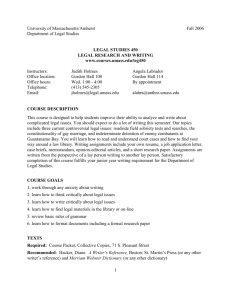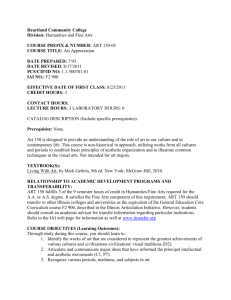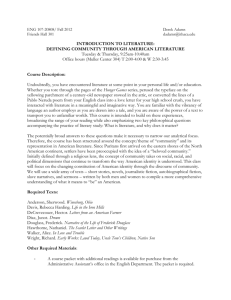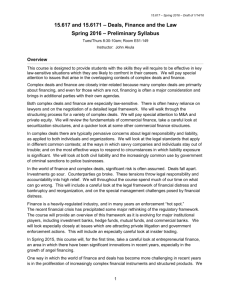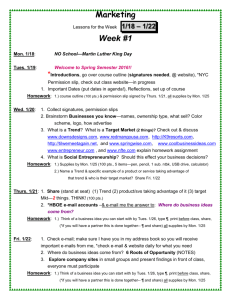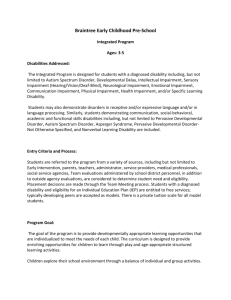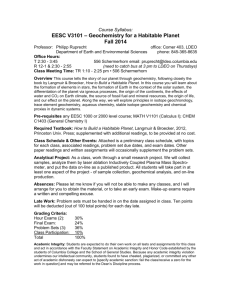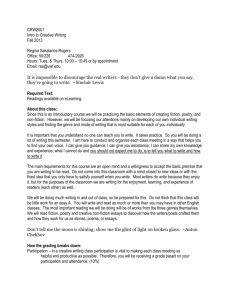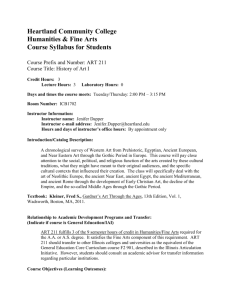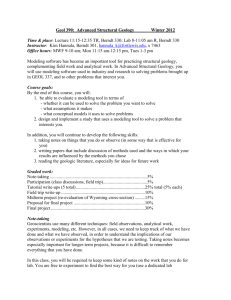PSY 255: Method and Theory in Psychology - Sean Duffy
advertisement
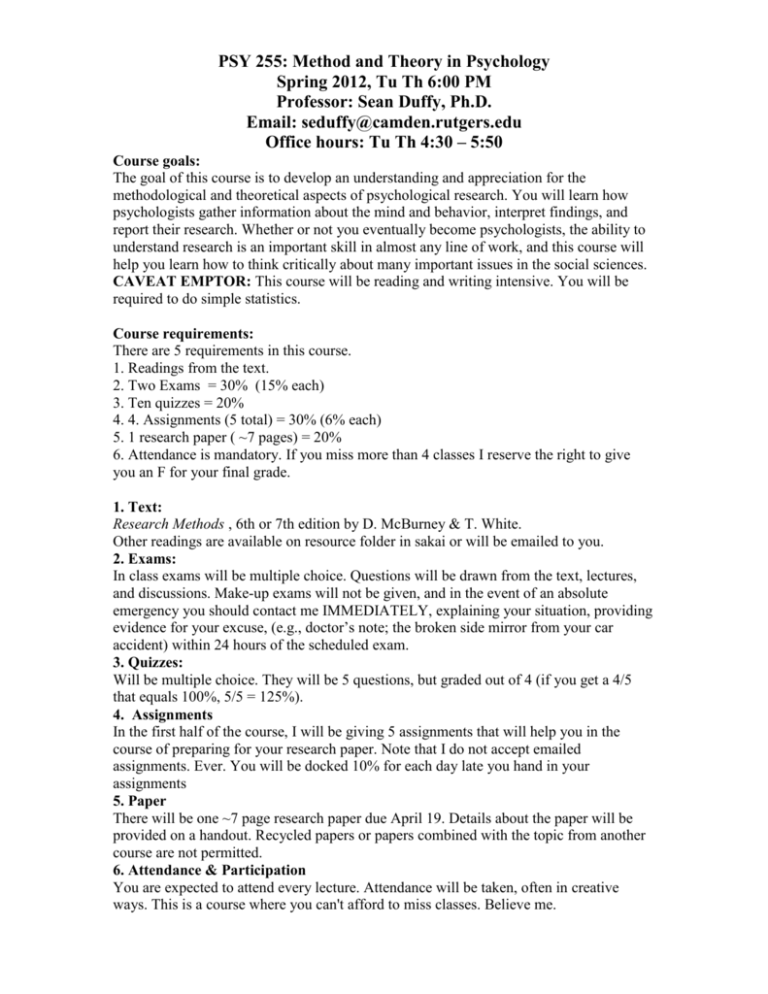
PSY 255: Method and Theory in Psychology Spring 2012, Tu Th 6:00 PM Professor: Sean Duffy, Ph.D. Email: seduffy@camden.rutgers.edu Office hours: Tu Th 4:30 – 5:50 Course goals: The goal of this course is to develop an understanding and appreciation for the methodological and theoretical aspects of psychological research. You will learn how psychologists gather information about the mind and behavior, interpret findings, and report their research. Whether or not you eventually become psychologists, the ability to understand research is an important skill in almost any line of work, and this course will help you learn how to think critically about many important issues in the social sciences. CAVEAT EMPTOR: This course will be reading and writing intensive. You will be required to do simple statistics. Course requirements: There are 5 requirements in this course. 1. Readings from the text. 2. Two Exams = 30% (15% each) 3. Ten quizzes = 20% 4. 4. Assignments (5 total) = 30% (6% each) 5. 1 research paper ( ~7 pages) = 20% 6. Attendance is mandatory. If you miss more than 4 classes I reserve the right to give you an F for your final grade. 1. Text: Research Methods , 6th or 7th edition by D. McBurney & T. White. Other readings are available on resource folder in sakai or will be emailed to you. 2. Exams: In class exams will be multiple choice. Questions will be drawn from the text, lectures, and discussions. Make-up exams will not be given, and in the event of an absolute emergency you should contact me IMMEDIATELY, explaining your situation, providing evidence for your excuse, (e.g., doctor’s note; the broken side mirror from your car accident) within 24 hours of the scheduled exam. 3. Quizzes: Will be multiple choice. They will be 5 questions, but graded out of 4 (if you get a 4/5 that equals 100%, 5/5 = 125%). 4. Assignments In the first half of the course, I will be giving 5 assignments that will help you in the course of preparing for your research paper. Note that I do not accept emailed assignments. Ever. You will be docked 10% for each day late you hand in your assignments 5. Paper There will be one ~7 page research paper due April 19. Details about the paper will be provided on a handout. Recycled papers or papers combined with the topic from another course are not permitted. 6. Attendance & Participation You are expected to attend every lecture. Attendance will be taken, often in creative ways. This is a course where you can't afford to miss classes. Believe me. Other rules: Classroom behavior The use of portable electronic devices (cell phones, text messaging, pagers, laptops, blackberries, Nintendo things) is strictly prohibited. How would you feel if, while you were telling me something very important, I took out my phone and started texting my friends? You’d probably think that I’m rude. Don’t even try violating this one. I really will throw you out of class, because you’re not learning anyway if you’re not listening carefully to me or your fellow students. Sakai I use Sakai for distributing materials, grading, and general announcements. Please use Sakai, or learn how to use it. Not knowing how to use Sakai is no excuse for not receiving important announcements or course materials. Get with the digital age, man! Use your Rutgers Email When I email the class, I use the list that the Registrar gives me. I can not change this list, and it is your responsibility to either use your Rutgers email account or set up your Rutgers account so that you receive emails in your personal account. If you use some other account, such as imafoolishrutgersstudent@yahoo.com, you may not receive my emails, and you will definitely not receive pity from me. Academic Honesty: You are expected to read and understand rules regarding academic misconduct. Ignorance of these rules will not be accepted as an excuse for academic misconduct. If you are found cheating on exams or plagiarizing on your paper, you will receive a failing grade for the paper and I will report you to the Office of Academic Affairs. Period. I offer no exceptions to this rule, ESPECIALLY ignorance of what plagiarism is. Rutgers maintains a website with specific guidelines concerning academic honesty. You are expected to read and understand all of these rules: http://academicintegrity.rutgers.edu/ Class cancellations: In the event of a natural disaster (e.g., snow storm, earthquake, tsunami) class may be cancelled. In the case of bad weather, check your email to be sure that I have not cancelled class. (See above section on using your Rutgers email) Incompletes / Pass – No-credit: Granted ONLY under unusual situations. Poor performance in the course is not a valid reason for requesting an incomplete. Those signed up for pass/no-credit, a final grade of a C or better is required to pass. Disability accommodations: For disability accommodations, please call the Disability Services Coordinator. Students who require special accommodations for the course or its assignments or exams (as indicated by a formal letter/statement from the Disability Services Coordinator) should also contact the instructor as early as possible. Missed class: Get to know someone in this class. Not only might you make a new friend, you will have someone to borrow notes from in the rare and unusual circumstance in which you might have to miss lecture. I will not provide you with lecture notes. Stapled assignments: I discard assignments that are not stapled. I mean, it says a lot about how much effort you put into your assignment when you toss it to me with the corner folded over. Find a stapler – in fact, purchase one of those pocket staplers at the dollar store. And cover the back of the staple with tape. Forbidden excuses: “You expect me to do all this work…I have to work all day and then come here…” Remember…I didn’t force you to work full time and force you to sign you up for this class. You chose to work full time and signed up for this class. This is college, not kolage. “Professor Duffy, I’m sick but my assignment is attached to this email” I’m sorry you’re sick, but I don’t read papers emailed to me, period. Submitting a paper to me electronically is the same as not submitting it at all. Emailing it to me on the due date then handing it in later will result in the same penalty for being late. Listen, folks, if you tried this kind of shortcuts in your job, you’d be written up. Treat this class as you treat your job. Get the email of a friend in this class so that you can email the friend the assignment and will hand it in for you. I once lost 2 months of work due to a virus sent to me by a student paper. I simply no longer accept emailed assignments. “I text in class because I, like, need to know what my friend is up to in her class. Like, Dr. Duffy, you have to understand that I like have a social life outside of this class.” A student actually said this to me. You really don’t want to be this student, who ended up with an F. “I didn’t know that copying and pasting from wikipedia was plagiarism!” See my excerpt about academic honesty above. Have a nice meeting with the Dean of Students. I reserve the right to make any changes to this syllabus. It is your responsibility to come to class and be aware of any changes to this syllabus. Course Schedule: The course schedule provided here is tentative. WEEK 1: Tues, 1/17: Introduction to the course Reading: Chapter 1 Thurs, 1/19: What is science and why was Socrates wrong? WEEK 2: Reading: Chapter 2& 3 Clark, R. D., & Hatfield, E. (2003) Love in the afternoon. Psychological Inquiry, Vol 14, 227-231. Clark, R. D., & Hatfield, E. Gender differences in receptivity to sexual offers. Journal of Psychology and Human Sexuality, 2, 39 - 55. Tues, 1/24: Film: The Harmony of the worlds Wed, 1/26: Developing YOUR research question (An introduction to your project) WEEK 3: Reading: Appendix A Duffy, S. (2007) Psychological Research on Children and Childhood. To appear in V. Bowman (Ed.) Scholarly Resources in Children and Childhood Studies, Scarecrow Press. Tues, 1/31: Ethics Thurs, 2/2: Introduction to the library WEEK 4: Reading: Chapter 4 Zdzior, A. (2005) Effect on restaurant tipping of writing “thank you” and drawing smiling faces on the backs of customers’ checks. Unpublished Manuscript: Rutgers University. Tues 2/7: Writing in psychology Thurs, 2/9: Review of Statistics ***Assignment 1 DUE Tues 2/7*** WEEK 5: Reading: Chapter 5 Stevens on measurement Tues, 2/14: Variables and Thurs, 2/17: Theoretical and empirical constructs ***Assignment 2 DUE THURS 2/17*** WEEK 6: Reading: Duffy & Verges, It Matters a Whole Lot Tues 2/21: Discussion of your research topics and projects Thurs 2/23: continued WEEK 7: Reading: Chapter 6 Levitt, S. & Dubner, S. (2005) Freakonomics, chapters 5 & Epilogue Tues, 2/28: Graphs and tables Thurs 3/1: continued ***Assignment 3 DUE TUES 2/28*** WEEK 8: Reading: Chapter 7 & 8 Lind-experiment Tues, 3/6: Validity Thurs, 3/8: Control SPRING BREAK! WHOO HOO! WEEK 9: Tues, 3/20: Discussion and exam review Thurs, 3/22: EXAM 1 (Chapters 1 – 8) ***Assignment 4 DUE TUES 3/20*** WEEK 10: Reading: Chapter 9 & 10 Broca, P. (1861) Loss of Speech Bulletin de la Socete Anthropologique, 2, 235-238. Gigerenzer, G. (2004). Dread risk, September 11, and fatal traffic accidents. Psychological Science, 15, 286-287 Reid, E., & Novak (1975) Personal Space: An unobtrusive measures study. Bulletin of the Psychonomic Society, 5, 265-266. Tues, 3/27: Non-experimental designs Thurs, 3/29: Survey designs WEEK 11: Reading: Chapter 11 & 12 Rosa – Therapeutic touch Tues, 4/3: Single factor experiments Thurs, 4/5: Multiple factor experiments ***Assignment 5 DUE TUES 4/3*** WEEK 12: Reading: Chapter 13 & 14 Kruger Tues, 4/10: Single participant experiments Thurs, 4/12: Quasi-experimental designs WEEK 13: Reading: Epilogue Richard Feynman, Cargo Cult Science Tues, 4/17: Limitations of Science Thurs, 4/19: Discussion of results *******PAPER DUE THURS 4/17******* WEEK 14: Tues, 4/24: EXAM REVIEW (Chapters 9 – Epilogue Thurs, 4/26: EXAM 2 (Chapters 9 – Epilogue)


